This is the last part of a 3-part series on femininity: how I used to struggle with my femininity, how I felt repressed having to behave in a particular way as a woman, and how I found my place as a female in today’s world.
- Part 1: Growing Up with Repressed Femininity
- Part 2: The Dichotomy Between Masculinity and Femininity
- Part 3: Coming Into My Own as a Woman

(Image: lauren rushing)
For years, I struggled with an inferiority complex surrounding my lack of femininity, or at least, what I thought was a lack of femininity. It was only recently that I came into my own as a woman, through a series of self-realizations.
1. Recognizing my (womanly) beauty
One of the reasons I kept feeling that I wasn’t feminine (enough) was that I felt I wasn’t beautiful enough as a woman. I kept feeling that I couldn’t be recognized as a woman until I achieve my ideal vision of beauty. This was especially so as beauty is a heavy marker of a woman’s worth, at least it was during my time.
However, when I was traveling in Europe and the U.S. in 2011, I realized that beauty doesn’t come in one form, shape, color, or even size. Beauty exists everywhere, in all forms, shapes, colors, and sizes. Living in an Asian society where the same image of beauty is marketed at people (stick thin, waify looking models with Caucasian features and extremely fair skin), I was taught to only see beauty in one way and one form that I was unable to recognize beauty in other forms.
For more on my revelations on beauty, read The Beauty of Self – Why I Used To Feel Inferior about My Looks.
So it turned out that I’ve been perfectly beautiful all along — I had just been unable to see it because I was blindsided. While I may still have an interest to look nice, dress well, and so on, these desires became driven by my desire for self-improvement rather than self-hate (which used to be my primary motivator).
Recognizing my individual beauty was my first step towards building my self-worth as a woman.
2. Realizing the femininity that has always been in me
My second blockage was my inferiority complex over having male-associated traits like drivenness, ambition, assertiveness, resilience, competitiveness, and decisiveness.. Since the traditional Asian culture defines femininity as having feminine traits like being sweet, coy, dainty, and demure, and masculinity as having masculine traits like being driven, assertive, resilient, outspoken, and so on, I felt like a non-female for embodying so many “male” traits — much less in such a strong manner.
There were two conversations that I had with my friends which broke me out of this self-belittling belief.
“Everything you think is masculine about you is actually feminine”
The first conversation was 10 years ago, with my then-best friend K. (I was in my late teens then.) At that time, I often lamented to K that I was afraid of repelling men because I was tough, critical, passive aggressive, and so on (these were traits that I embodied back then).
Interestingly, K always thought that I was completely off base. He often said that I was 100% feminine the way I was, and what I thought were masculine about myself were actually expressions of my femininity.
For example, he saw my toughness as being feminine — it was strength embodied in a feminine way. My criticalness was feminine as well — I was being attentive to and invested in details in a way a girl would. He also saw my passive aggressiveness as feminine — most guys would act in an open and direct manner rather than in a roundabout, passive aggressive way like I would sometimes.
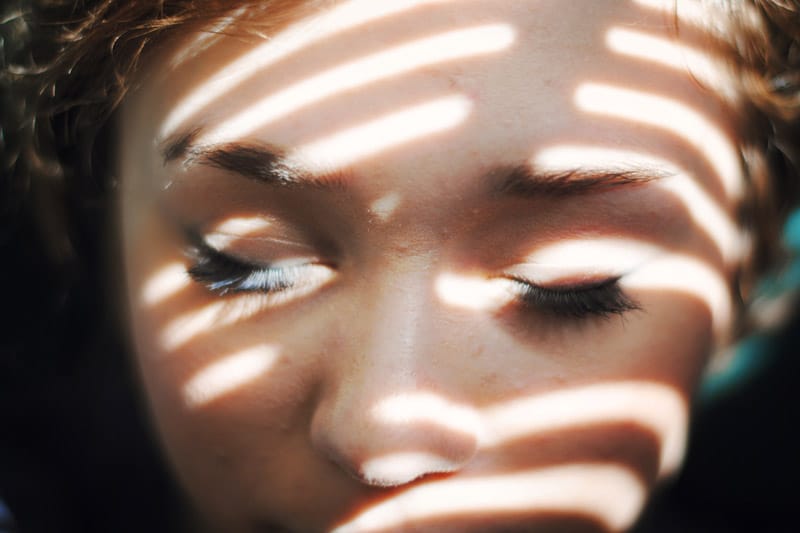
(Image: lauren rushing)
Hearing K’s words comforted me, for I had never seen my situation that way before. But because most people I know wouldn’t think that way and because I felt that he was just saying that to comfort me, I disregarded his words. I would revisit his words of wisdom ten years later.
Having masculine traits doesn’t make me any less feminine
Fast forward ten years to 2013, when I was chatting with my friend W one random evening.
While we were talking about relationships and gender roles, W mentioned that he has never been a masculine type of guy, especially when compared with his guy friends. Rather, he has always been regarded as a guy with high feminine energy.
When I heard that, I was surprised as I have never once thought of W as “feminine.” If anything, he’s quite masculine — strong character, self-aware, self-directed, and articulate. Even though he does have traits that are commonly regarded as being more feminine than masculine, such as preferring to follow than lead, these traits don’t make him any less of a male — they are probably what makes him a great guy and a great friend. If he isn’t the way he is, I probably would have never gotten so close to him as a friend.
Wait a minute, I thought. If W has feminine traits but it doesn’t stop him from being masculine, shouldn’t that mean that my masculine traits shouldn’t stop me from being feminine as well?
Suddenly I realized that my worries about being masculine were unfounded. If W can have feminine traits but still be masculine, that means my masculine traits shouldn’t stop me from being feminine. It’s just that my femininity wouldn’t be your coy, demure, blush-blush female archetype often celebrated in the traditional Asian culture (though it can still happen to me) — it’s an assertive, self-directed, bold, and driven type of femininity.
This was what K had been trying to tell me all this while. Realizing the wisdom behind his words, suddenly, I could see the femininity in me that I could never see before. This femininity exists in every part of me, from my day-to-day thoughts and feelings, to the way I express myself, to the way I carry myself, to the traits I embody — including my supposedly masculine traits.
3. Redefining femininity

(Image: lauren rushing)
Following point #2, I needed to revisit the definition of femininity.
Traditional Asian culture defines femininity as being saccharine sweet, demure, quiet, submissive, abiding, and so on. This was why I kept feeling that I was too masculine and that I lacked femininity.
However, when I look at inspiring women figures today like Oprah Winfrey, Tyra Banks, Ellen DeGeneres, and Ivanka Trump (note from Celes in 2020: This was back in 2013, before issues regarding Ellen’s toxic workplace environment became known and before Ivanka became complicit as the advisor to Trump when he was the US president), they all have supposedly masculine qualities (as regarded in the Asian culture) like being driven, ambitious, competent, talented, sharp, tough, independent, and intellectual. Yet, they don’t come across as unfeminine at all.
For example, Oprah Winfrey is firm in the way she speaks, but she comes across as a mother who just wants the best for you. Tyra Banks is strong, successful, and career-minded, but she has this womanly, va-va-voom appeal about her at the same time. Ivanka Trump is tough, smart, business-savvy, with a no-nonsense attitude, but that doesn’t stop her from projecting a feminine demeanor.
The same applies to Hua Mulan, an inspirational legendary figure from ancient China. She was a female who — due to filial piety and love for her father — took her aged father’s place to fight in the army for 12 years. Mulan is an exemplification of a strong woman who maintains her feminine allure despite taking on a role traditionally assigned to males, which is fighting in the military.
For all these women, their masculine qualities do not take away their feminine allure. Rather, they enhance it.
Clearly, femininity comes in many more forms than just the one-template definition in the traditional Asian culture (or any culture for that matter). Having masculine traits does not take away my femininity because femininity doesn’t just exist in the form of a traditional Disney Princess or a submissive dainty woman in traditional Chinese culture. Femininity can come in all forms, mannerisms, attitudes, and demeanors.
To further illustrate my point, do you know that all of us are a mix of male (testosterone) and female (estrogen and progesterone) hormones? None of us have 100% male or female hormones. What differentiates between the male and female gender is the proportion of male and female hormones; even then, people of the same gender can have a different proportion of hormones.
Understanding this was critical in helping me embrace my natural self and my natural traits. No more feeling ashamed of my masculine traits; these are a natural part of who I am. No more concealing my forward self, my ambition, and my opinions; these are simply who I am.
4. Not subjecting myself to what guys think/want

(Image: lauren rushing)
My third and last blockage was my constant attempts to appeal to men in my culture, by trying to conform to the idealized image of the petite, dainty, shy, and quiet woman.
I often felt that I lacked femininity because I tend to overpower, at times intimidate, men in my culture without trying to do so. My culture is one where people tend to be more reserved, hold back their opinions, and conform rather than stand out — a stark contrast to my openness, forwardness, and preference for individuality. So combine this with my culture’s archetype of a girly female, and I stick out like a sore thumb.
So I thought I was broken as a woman. Why are some men antagonistic towards me? Why do some men seem scared of me? Why do some men treat me with resistance compared to other women? Am I that scary as a woman? I thought.
But I realized earlier this year in 2013 (which I’ve written about here) that just because men seem scared of me doesn’t mean that I’m not feminine. It just means that they can’t handle my true self, and that their personalities are not a match with mine (be it as a friend or romantic interest). Rather than beat myself down for intimidating certain men, I should instead meet and hang around men with big-enough personalities that match mine.
And that I did. I have very good guy friends today who are accomplished in their own right and celebrate my success with me. My fiance loves that I’m an accomplished, self-directed woman who is intellectual and upfront about her opinions. The best thing is that I’m 100% my natural self around them — I do not need to suppress myself; neither do they feel intimidated by me at all. If anything, I’m encouraged to grow and reach for higher grounds thanks to their support and encouragement.
More on guy intimidation: Why I Used To Be Afraid of Intimidating Men and Why It Does Not Faze Me Anymore
5. Developing my feminine self (without suppressing my masculine side)
My final step to come into my womanhood is to embrace my natural, feminine traits.
All these years, I have honed my masculine side well. From being driven, resilient, articulate, assertive, self-confident, competent, adaptable, to sharp, these are traits that I have developed, built, and refined.
In fact, my masculine side is so developed that the “Emperor” card appeared during a (highly accurate) tarot card reading I did in Spain in 2011; it represented my “masculine” traits which have carried me this far in life and have been key building blocks to my success. (This reading also alluded to Ken’s arrival in my life; this would be a separate article for a separate day.)
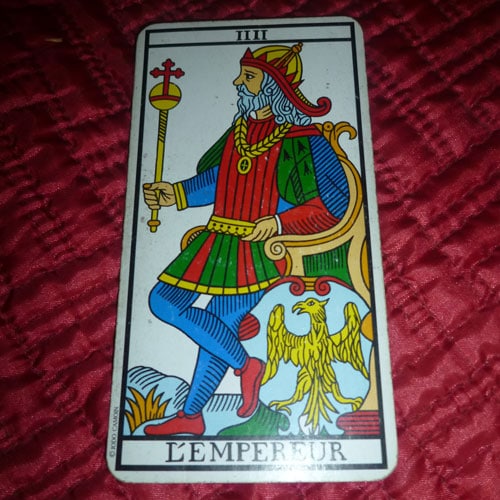
(Image: Personal Excellence)
Having developed my masculine side, my next step is to hone my feminine side. This comprises traits like being gentle, kind, compassionate, nurturing, empathetic, and loving.
While I used to feel conflicted when trying to hone my femininity in the past, this was because I saw feminine traits and masculine traits mutually exclusive. The fact is that masculine traits can coexist with feminine traits; it’s probably the embodying of masculine and feminine traits that allows one to get the best of both worlds.
This is similar to the concept of yin-yang in Ancient Chinese philosophy, which describes how seemingly opposite or contrary forces are actually interconnected and interdependent in the natural world. Many dualities (such as male and female, light and dark, hot and cold, fire and water, day and night, and so on) can actually be explained with the yin-yang concept.
I’ve developed a comprehensive 30-day program on character development, which covers how to identify your ideal self, build your desired traits, and remove undesirable traits, among other exciting character-development tasks. Read more: Be a Better Me in 30 Days.
Final Words
It’s been a long time coming, but I’m happy to finally be in tune with my natural femininity today. It’s not femininity as traditional culture defines it, but femininity on my terms and in my definition. And I’m proud of it.
Originally I wanted to write a fourth part about finding your natural femininity, but then I realize that this part on my revelations actually covers what I would want to say in a fourth part. I hope you have found my experience useful in finding your own femininity.
Ultimately, I enjoy being female and that’s why I wanted to find my femininity. It’s part of embracing my natural self, such as being Singaporean, Chinese, and Asian, while staying true to my values.
Thank you for reading this series and I appreciate all your kind comments and feedback. :) Here are some related pieces:
- The Beauty of Self – How I Used To Feel Inferior about My Looks
- How to Have a Positive Body Image: Complete Guide
- Why I Used To Be Afraid of Intimidating Men and Why It Does Not Faze Me Anymore
- Why I Used To Hate My Feet
Being a woman is more challenging than ever in today’s world, where a woman is expected to take on many roles, from being a mother, to a wife/girlfriend, to a daughter, to a career woman, to an amazing friend. A woman is expected to look great, be accomplished, be a great homemaker, and be a great mother (if she has kids).
Yet, I think this is part of what makes being a woman exciting, because more than ever, we are now given the space to be who we can truly be vs. in the past when women were seen as only fit to be homemakers.
I’ll leave you with this quote:
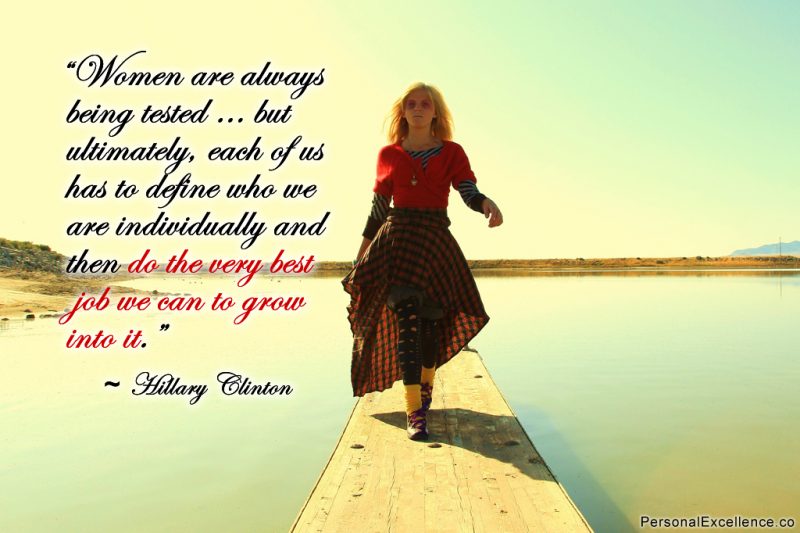
(Image: Personal Excellence; Photo: Pink Sherbet)
Thanks everyone (both guys and girls); let’s keep rocking. :)
This is the last part of a 3-part series on femininity: how I used to struggle with my femininity, how I felt repressed having to behave in a particular way as a woman, and how I found my place as a female in today’s world.

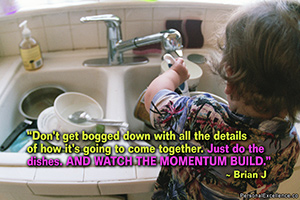
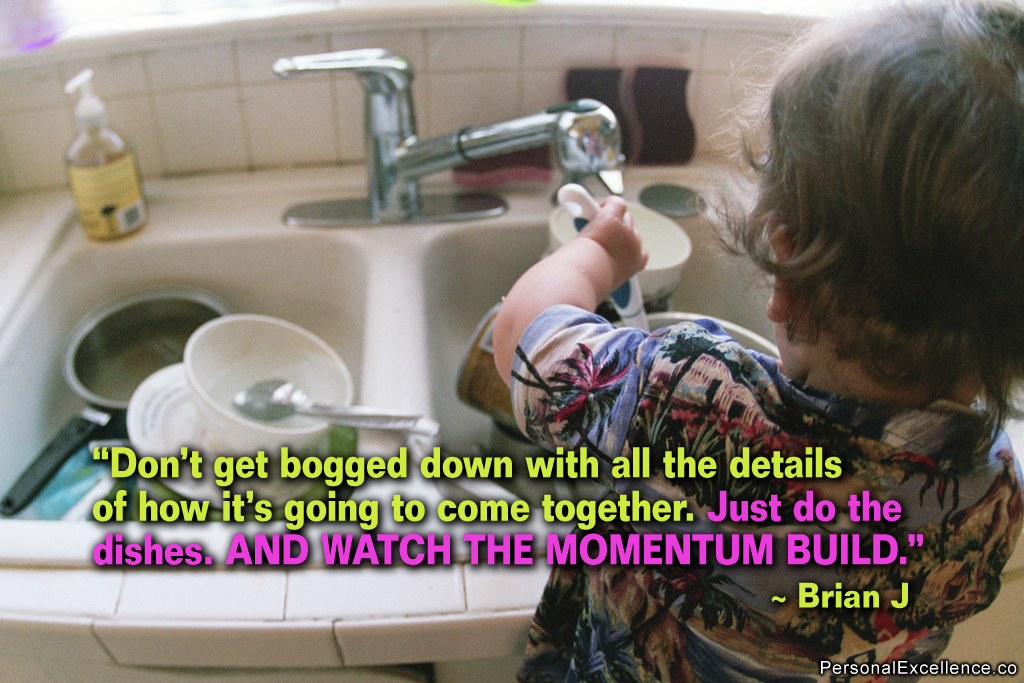

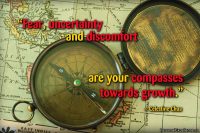




 Thanks for reading. If you like my free articles, join my private email list and get my latest updates and articles sent right to your inbox.
Thanks for reading. If you like my free articles, join my private email list and get my latest updates and articles sent right to your inbox.